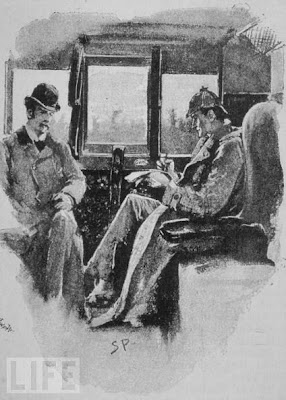Previous: Holmes Returns From Cheltenham
 |
| A policeman guards 36 Alderney Street, Pimlico, London. |
"It's a 'safe house', Watson. What does that mean? Typically, there would be a hidden entrance so people could come and go without being seen, and each flat would be soundproofed so nobody could overhear what was going on -- that would be necessary for interrogations, let us say.
"It would also have all the usual high-security arrangements: bullet-proof windows, steel doors, probably with biometric locks, full-time audio and video surveillance, and a direct line to MI6."
"One of the later news reports mentioned the direct line," I interjected, "saying it hadn't been used."
"That may be a crucial detail, Watson," Holmes said. "We can never know what might turn out to be important. On the other hand it might be just another diversion, like the nonexistent gay porn and the dresses that weren't there."
"And what do you make of all that, Holmes?" I asked. "Is it just shoddy reporting, the profit-motive driven to cheap sensationalism and run amok? Or is it something more sinister?"
"You've read the news reports that I've collected." the detective said. "I can't claim to have found everything ever published about this case, but I do believe we have a representative sample. What struck you about the coverage, Watson?"
"It was all so lurid," I said "but aside from that, it's been so scattered and unfocused as to be virtually meaningless!"
"On the contrary, dear Watson," Holmes replied, "In a case of bloody death -- a stabbing, let us say, especially one with multiple wounds -- an observant investigator can learn a great deal from the 'splatter', the way the blood is distributed around the scene."
"But in this case there was no blood," I replied. "No wounds or marks on the body of any kind, according to William Hughes."
"Of course there wasn't, Watson. In this case, I think we can find meaning in the way the press coverage was 'splattered', if you will allow me the liberty."
"I'm not sure I follow you, Holmes."
"If we group the reports chronologically, allowing for the 'lag time' it takes for news to spread, we find an intriguing pattern."
"How so?" I asked.
"The first reports contained sensational lies about the body, and that was when we read that Gareth Williams had been stabbed or that his body was dismembered. Hints were given that he had been killed by a jealous lover. But at the same time the idea that his death was the result of 'a bizarre sex game gone wrong' was already being floated.
"Then came the wave of sex-scandal. There were reports that he was a transvestite, had contacts at male escort agencies, kept bondage equipment at his flat, and so on. The police took the very unusual step of denying all this, but still the nonsense about bizarre sex kept coming.
"Next it was who-done-it, and we were treated to a spectacular array of suspects: it was the Russians, or the Chinese, or Muslim terrorists, or a violent Irish Republican faction. Or maybe it was a jealous lover, or 'a bizarre sex game gone wrong'. The pattern in the timing of is one of the keys, Watson. Also worth noting is the continuous undercurrent of 'bizarre sex', especially since the most lurid allegations have been denied by the police themselves."
"Ah, yes indeed, Holmes," I agreed.
"That's one aspect of the 'splatter', Watson. Here's another: Look at the earliest news reports which claimed bizarre sex-related objects were found at the flat. They all had the same basic line, but some -- perhaps even most -- also had unique or 'exclusive' details, to titillate their readers in ways their competitors could not.
"To take the most obvious instance: the Sun, under the headline 'Murdered spook was a cross-dresser', provided sensational -- though untrue -- information about the scene of the crime that was not available elsewhere. Other papers contained other unique details, most of which were later denied by the police themselves.
"How did this all come about?" Holmes continued. "Were all these reporters making things up? Or were they being fed disinformation from a central source?
"The third aspect of my 'splatter analysis', as it applies to the present case, is a different sort of question, namely: Why is this story in the papers at all? There are editors at every paper who would deep-six any story, short of the second coming of Elvis, at the mere mention of the Official Secrets Act. It would have taken one phone call to each paper to make this entire story invisible, and we always have to keep that in mind.
"In terms of my knife-wound analogy," Holmes continued, "we must ask not only 'Why is there blood here but not there?' but also 'Why are we finding any blood at all?'"
"So the phrase 'safe house' should be seen as a metaphor, in other words?" I asked. "Are you saying MI6 should have been able to protect their man and his family from all this outrageous press?"
"Indeed, Watson," he replied. "If they hadn't wanted all this rubbish in the papers, it wouldn't have been there."
"Unless I misunderstand you, Holmes," I said, "this could be one of the deepest, darkest mysteries that you've ever solved!" I hoped he heard more excitement in my voice than fear.
"I haven't solved it yet, Watson," he replied, "and perhaps I never will. But it is certainly deep and very dark, I will give you that!"
Next: Buckingham Slate



